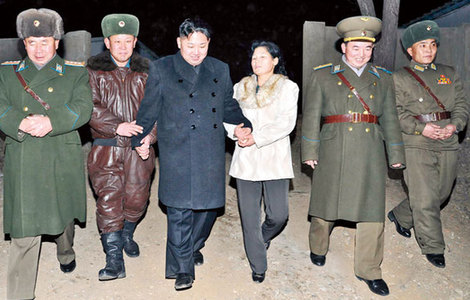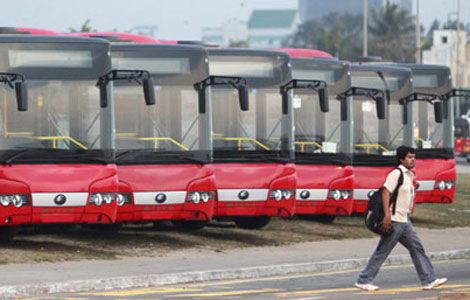Beijing against sanctions on Syria
Updated: 2012-02-02 07:59
By Zhang Yuwei and Li Lianxing (China Daily)
|
|||||||||||
Forcing regime change in Syria violates charter, UN envoy says
UNITED NATIONS / DAMASCUS - China expressed its opposition to military intervention, or the introduction of new sanctions, to resolve the situation in Syria as Beijing issued a travel alert and reminded its citizens already in the country to step up security measures.
"We firmly oppose forcefully pushing for 'regime change', which violates the purpose and principles of the UN Charter and the basic norms governing international relations," Li Baodong, China's ambassador to the United Nations, said during a Security Council debate on Syria on Tuesday.
The council was debating an Arab League plan calling for an end to violence and for the Syrian president to step down.
Both China and Russia said that this resembled forced regime change.
Li said that "sanctions, rather than help resolve an issue, often lead to further complications". He also said China supports Russia regarding the situation in Syria.
In the first complete expression of China's position on the Syrian issue, Li's remarks showed that China does not want a rerun of events in Libya, Chinese experts said.
The Security Council adopted a resolution last year to authorize "all necessary measures" to protect Libyan civilians. NATO military action followed.
Yin Gang, an expert on Middle East studies at the Chinese Academy of Social Sciences, said that both China and Russia do not want the Security Council to be used as an excuse for military intervention.
"The political system in Syria may need to be improved, but the change should be made through non-violent means," Yin added.
Li said on Tuesday that the Syrian people will find a way out of the crisis. "Syria and its people are sufficiently able and resourceful to find a political system and mode of economic growth suited to Syria's national conditions."
Moscow's ambassador to the UN, Vitaly Churkin, argued in Tuesday's debate that Syria should "be able to decide for itself", reiterating Russia's opposition to sanctions or the deployment of troops.
Arab states, the United States and European nations, however, are pushing the council to adopt a draft resolution to demand what they called "political transition" in Syria and endorse an Arab plan for Syrian President Bashar al-Assad to step down.
Jihad Makdissi, spokesman for the Syrian Ministry of Foreign Affairs, said on Wednesday that the current crisis is complicated and not a simple "black or white" issue.
"Syria is responding to dialogue and the government is saying yes to any constructive, not destructive, initiative," Makdissi told China Daily.
Ye Hailin, a researcher on the Middle East at the Chinese Academy of Social Sciences, said he thought that the Arab League and the Gulf Cooperation Council would play a key part in any resolution.
Safety caution
The Ministry of Commerce on Wednesday urged Chinese citizens and companies in Syria to exercise caution.
The ministry warned citizens to avoid traveling to Syria and urged Chinese companies to enhance security procedures.
Wang Chenyan in Beijing contributed to this story.
China Daily
Hot Topics
Kim Jong-il, Mengniu, train crash probe, Vaclav Havel, New Year, coast guard death, Internet security, Mekong River, Strait of Hormuz, economic work conference
Editor's Picks

|

|

|

|

|

|







